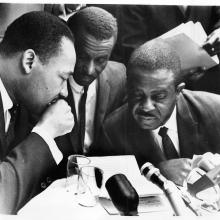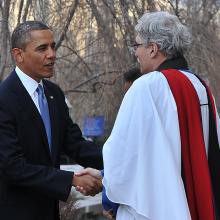civil religion
In the midst of a raging discussion about what it means to be American, it is worthwhile to reflect on the profound ambivalence of American civil religion — perhaps the most powerful force for creating a shared national identity.
In 1967, Robert N. Bellah’s seminal essay, “Civil Religion in America,” created a template for how both the right and the left defined civil religion to cultivate a sense of belonging, particularly in an era of turbulence. During this period of increasing polarization, Bellah’s words are more relevant than ever.
It may be the most famous speech of the 20th century.
Millions of American schoolchildren who never experienced Jim Crow or whites-only water fountains know the phrase “I have a dream.”
And many American adults can recite from memory certain phrases: the Rev. Martin Luther King Jr.’s use of the prophet Amos’ vision of justice rolling down “like waters and righteousness like a mighty stream,” or the line about children being judged not by “the color of their skin but the content of their character.”
To many in this country, “I have a dream” has a place of honor next to the Declaration of Independence, the Emancipation Proclamation and the Gettysburg Address. It celebrates the lofty ideals of freedom.
But scholars say it would be a mistake to celebrate the speech without also acknowledging its profound critique of American values.
A presidential inauguration is by tradition the grandest ritual of America’s civil religion, but President Obama took the oath of office on Monday in a ceremony that was explicit in joining theology to the nation’s destiny and setting out a biblical vision of equality that includes race, gender, class, and, most controversially, sexual orientation.
Obama’s speech, his second inaugural address, repeatedly cited civic and religious doctrines — namely the God-given equality extolled by the “founding creed” of the Declaration of Independence — to essentially reconsecrate the country to the common good and to the dignity of each person.
It was a faith-infused event that recognized both the original sins as well as the later atonements of America’s history, especially on race, which was front and center as the nation’s first African-American president took the oath on the holiday commemorating the Rev. Martin Luther King, Jr.
And Obama and other speakers vividly traced the nation’s tortuous path from slavery to civil rights — from the Emancipation Proclamation 150 years ago to the March on Washington 50 years ago, the latter presided over by King.
Tonight, Sojourners and the Ethics and Religious Liberty Commission are co-sponsoring an event to discuss religion and the 2012 elections. Rev. Wallis and Dr. Richard Land will delve into what they believe the religious issues will be and should be from now until election day.
The event is already turning some heads. A Washington Post article by Michelle Boorstein summed up the unique nature of the event in a headline, "Evangelical opposites to hold discussion on 2012 presidential race."


